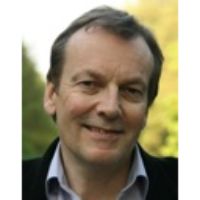
Christoph Drösser is an editor and staff reporter for the science section of the German weekly national paper Die Zeit. He has a graduate degree in mathematics and has written numerous general interest books, covering topics as varied as music and the brain, physics, logic, and weather. His book "Der Mathematikverführer" ("The Math Seducer") was a national bestseller in Germany in 2008. His weekly column about everyday myths ("Stimmt’s?”) has appeared in Die Zeit since 1997 and is a daily radio spot on two German radio stations. Drösser was a Knight Science Journalism Fellow at MIT in 1993-94, he has been named Science Journalist of the Year in Germany in 2005 by Medium Magazine, and he received the Media Prize of the German Mathematicians' Society (DMV) in 2008 for his contributions to the popularization of mathematics.
Christoph Drösser is looking forward to spend seven weeks in a community of scientists and is especially looking forward to the interdisciplinary seminars where physicists meet scientists from biology and brain science, hoping not to drown in equations.

I must admit, I spent a week in the company of one of this year’s medicine Nobel laureates – and missed the significance of the science. Edvard Moser participated in the seminar "Neurophysics of Space, Time and Learning” and presented his discovery of grid cells in rat brains. I attended several of the lectures in this six-week seminar that dealt with multidisciplinary approaches to pinpoint our sense of location in the brain – well, rats’ sense of location at least. I thought it was very interesting, but I didn't see how important this research was for our understanding of the brain and the relationship between objective and subjective reality.
What does this shortcoming show? First, that science journalists can be overwhelmed by the details and the intellectual level if you drop them into an environment where cutting edge scientists talk to their peers in very specialized lingo about their current work. And second, that KITP has a very good sense of what the important topics in physics are, and that it succeeds in giving the scientists in those fields a forum to exchange their ideas. (By the way: Edvard Moser and his wife May-Britt Moser not only received this year’s Nobel, they also won this year's 750,000 Euro Körber European Science Prize which is presented annually in my home town of Hamburg.)
I spent seven weeks as a journalist in residence at KITP, and I enjoyed every minute of it. Coming to the Institute, I immediately felt that I shared the space with an exceptionally intelligent crowd. After two or three lectures, I had to abandon the idea that I could understand the details of most of the talks – they are not geared to lay people, science journalists, or even students of the field; this is an exchange of like-minded scientists at a very high level of excellence. And then there were the moments when I did experience a gifted talker who could give a glimpse of what these researchers think and what their science is all about.
Almost more important than the lectures was the time between them, the casual exchanges during coffee breaks or in front of one of the many blackboards lining the hallways and offices. I wish that made a bigger effort to just walk up to one of the scientists and ask them very basic questions – I might have gotten a private lecture from a future Nobel laureate.
As for the scientists, a fellowship like this one is an opportunity for a journalist to step away from his or her newsroom or home office, get a broader view of the world and of his or her own career. They can be life changing weeks – in my case the opportunity sped up a big decision that I had been pondering for quite some time. A very wise teacher of mine (in another fellowship on the other side of the country) once told me that everyone should make a change in their lives, professional or personal (or both), every seven years. A journalist-in-residence fellowship at KITP can certainly help clarify decisions in these turbulent journalistic times.